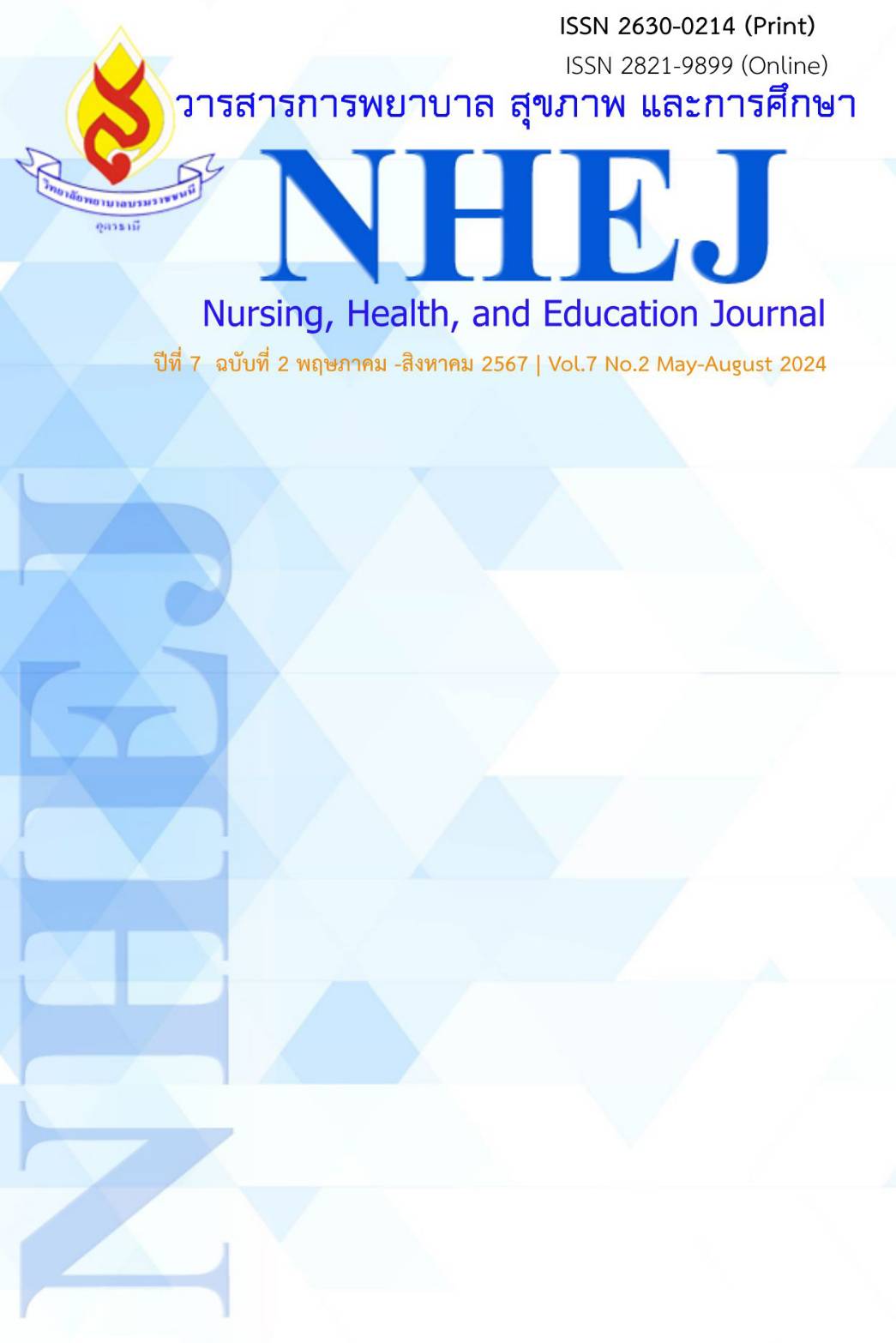ผลของโปรแกรมให้ความรู้อิเล็กทรอนิกส์ด้านสุขภาพต่อความรู้และทัศนคติ ในการป้องกันการสูบบุหรี่ไฟฟ้าของนักเรียนชั้นมัธยมศึกษาตอนต้น
คำสำคัญ:
โปรแกรมให้ความรู้อิเล็กทรอนิกส์ด้านสุขภาพ, การป้องกันการสูบบุหรี่ไฟฟ้า, นักเรียนชั้นมัธยมศึกษาตอนต้นบทคัดย่อ
บทนำ: สถานการณ์การใช้บุหรี่ไฟฟ้าโดยเฉพาะในกลุ่มนักเรียนชั้นมัธยมศึกษาตอนต้นมีแนวโน้มเพิ่มขึ้นอย่างต่อเนื่อง การป้องกันการเริ่มต้นของการสูบบุหรี่ไฟฟ้าเป็นกลยุทธ์ที่สำคัญในการควบคุมการบริโภคยาสูบ รูปแบบการจัดกิจกรรมที่ผ่านมายังขาดความน่าสนใจทำให้ได้รับความรู้ไม่เต็มที่และไม่เหมาะสมกับบริบทของวัยรุ่นทำให้ไม่สามารถลดจำนวนผู้สูบหน้าใหม่ลงได้
วัตถุประสงค์การวิจัย: เพื่อศึกษาผลของโปรแกรมให้ความรู้อิเล็กทรอนิกส์ด้านสุขภาพต่อความรู้และทัศนคติในการป้องกันการสูบบุหรี่ไฟฟ้าของนักเรียนชั้นมัธยมศึกษาตอนต้น
ระเบียบวิธีวิจัย: การศึกษาครั้งนี้เป็นการวิจัยแบบกึ่งทดลอง กลุ่มตัวอย่าง 120 คน ได้รับการสุ่มเข้ากลุ่มทดลองและกลุ่มควบคุม กลุ่มละ 60 คน กลุ่มควบคุมได้รับการเรียนการสอนตามปกติที่ทางโรงเรียนจัดให้ ในขณะที่กลุ่มทดลองได้รับการเรียนการสอนตามปกติที่ทางโรงเรียนจัดให้ร่วมกับการได้รับความรู้อิเล็กทรอนิกส์ด้านสุขภาพเพื่อส่งเสริมความรู้และทัศนคติที่ถูกต้องในการป้องกันการสูบบุหรี่ไฟฟ้า เป็นระยะเวลา 2 สัปดาห์ เก็บข้อมูลโดยแบบประเมินความรู้และทัศนคติในการป้องกันการสูบบุหรี่ไฟฟ้า ซึ่งมีค่าครอนบาซแอลฟ่าเท่ากับ 0.92 (n = 30) ก่อนการทดลอง และ 0.86 (n = 120) หลังการทดลอง วิเคราะห์ข้อมูลโดยใช้สถิติเชิงพรรณนาและสถิติที (Independent t-test)
ผลการวิจัย: พบว่า ก่อนการทดลองทั้งสองกลุ่มมีคะแนนความรู้และทัศนคติในการป้องกันการสูบบุหรี่ไฟฟ้าอยู่ในระดับปานกลาง ภายหลังการได้รับความรู้อิเล็กทรอนิกส์ด้านสุขภาพ กลุ่มทดลองมีค่าเฉลี่ยผลต่างของคะแนนความรู้และทัศนคติในการป้องกันการสูบบุหรี่ไฟฟ้า ระหว่างก่อนและหลังการทดลองมากกว่ากลุ่มควบคุมอย่างมีนัยสำคัญทางสถิติที่ระดับ .00
สรุปผล: การศึกษานี้แสดงให้เห็นว่า โปรแกรมให้ความรู้อิเล็กทรอนิกส์ด้านสุขภาพในการป้องกันการสูบบุหรี่ไฟฟ้านี้มีประสิทธิผลในการทดสอบเบื้องต้น
ข้อเสนอแนะ: สามารถนำผลการวิจัยไปใช้ในกลุ่มตัวอย่างที่มีขนาดใหญ่ต่อไป และควรศึกษาเพิ่มเติมในระยะยาว เพื่อติดตามผลว่าเกิดการเปลี่ยนแปลงความรู้ทัศนคติและความตั้งใจในการสูบบุหรี่ไฟฟ้าหรือไม่
เอกสารอ้างอิง
World Health Organization, “Global School-based Students Health Survey—fact sheet Thailand
&download=true
Patanavanich, R., Aekplakorn, W., Glantz, S. A., & Kalayasiri, R. Use of e-cigarettes and associated factors among youth in Thailand. Asian Pacific Journal of Cancer Prevention: APJCP 2021; 22(7), 2199-207. doi: 10.31557/APJCP.2021.22.7.2199
Thepthien, B. O., Tinn, C. S., Ofuchi, T., & Kim, B. (2021). An analysis of e-cigarette and polysubstance use patterns of adolescents in Bangkok, Thailand. Tobacco induced diseases, 19:88. doi: 10.18332/tid/142894
Cho, M. S. (2021, September). Factors associated with cigarette, e-cigarette, and dual use among South Korean adolescents. In Healthcare (Vol. 9, No. 10, p. 1252). MDPI. https://doi.org/10.3390/healthcare9101252
Fauzi, R., & Areesantichai, C. (2022). Factors associated with electronic cigarettes use among adolescents in Jakarta, Indonesia. Journal of health research, 36(1), 2-11. DOI 10.1108/JHR-01-2020-0008
Shin, S. H. (2021). Preventing E-cigarette use among high-risk adolescents: a trauma-informed prevention approach. Addictive Behaviors, 115, 106795.7.
Takviriyanun, N. (2006). The Roles of Environmental Risks and Resilience Factors on Alcohol Use among Thai Adolescents in School Settings. Faculty of Graduate Studies, Mahidol University.
Griffin, K. W., Williams, C., Botvin, C. M., Sousa, S., & Botvin, G. J. (2022). Effectiveness of a hybrid digital substance abuse prevention approach combining e-Learning and in-person class sessions. Frontiers in Digital Health, 4, 931276.
สุกัญญา สุรังษี, อัจฉราพร สี่หิรัญวงศ์, ยาใจ สิทธิมงคล, สุรินธร กลัมพากร, และ ฐิติพงษ์ ตันคำปวน. (2566). นวัตกรรมระบบบริการเลิกบุหรี่ในโรงเรียนสำหรับวัยรุ่นตอนต้น: การวิจัยปฏิบัติการอย่างมีส่วนร่วม (ระยะที่ 1 และ ระยะที่ 2) (รายงานวิจัยฉบับสมบูรณ์). ได้รับทุนสนับสนุนโดยศูนย์วิจัยและจัดการความรู้เพื่อการควบคุมยาสูบ (ศจย.) และ สำนักงานกองทุนสนับสนุนการสร้างเสริมสุขภาพ (สสส.)
ภาสกร เนตรทิพวัลย์. (2564). โปรแกรมสร้างเสริมความรอบรู้ทางสุขภาพเพื่อพัฒนาพฤติกรรมการป้องกันการสูบบุหรี่ในวัยรุ่นตอนต้นโดยประยุกต์การจัดการเรียนรู้แบบปรากฏการณ์เป็นฐาน. ปริญญานิพนธ์การศึกษาดุษฎีบัณฑิต สาขาวิชาสุขศึกษาและพลศึกษาคณะพลศึกษา, มหาวิทยาลัยศรีนครินทรวิโรฒ.
รุ่งรัตน์ ศรีสุริยเวศน์ และ พรนภา หอมสินธุ์. (2558). ผลของโปรแกรมป้องกันการเริ่มต้นสูบบุหรี่ที่ใช้โรงเรียนเป็นฐานในวัยรุ่นตอนต้น จังหวัดชลบุรี. วารสารพยาบาลศาสตร์ จุฬาลงกรณ์มหาวิทยาลัย, 27(3), 50-67. DOI: 10.58837/CHULA.CUNS.27.3.12
Kong, G., Blake, K. D., & Romer, D. (2024). Advances in Social Media Research to Reduce Tobacco Use. Nicotine and Tobacco Research, 26(Supplement_1), S1-S2.
Vogels, E. A., Gelles-Watnick, R., & Massarat, N. (2022). Teens, Social Media and Technology 2022. Pew Research Center: Internet. Science & Tech. https://www. pewresearch. org/internet/2022/08/10/teens-social-media-and-technology-2022.
Marzo, R. R., Bhattacharya, S., Ravichandran, S., Lakshmanan, P., Jeffery, V. R., Moralitheran, P., ... & Naidu, J. R. (2019). Educating school students and gauging their perception about the harmful effects of smoking using a “Facial-Ageing App (mobile application):” An experience from Malaysia. Journal of education and health promotion, 8(1), 250.
Ridha, A., Ramadhani, D., Trisnawati, E., Radiana, D., & Ruhama, U. (2022). Improving knowledge and attitudes about prevention and cessation of smoking using comics: study on youth with smoker´ s social environment. Pan African Medical Journal, 43(1).
Mahabee-Gittens, E. M., Merianos, A. L., & Matt, G. E. (2018). Preliminary evidence that high levels of nicotine on children’s hands may contribute to overall tobacco smoke exposure. Tobacco control, 27(2), 217-219.
Fraser, M.W., Kirby, L.D., & Smokowski, P.R. (2004). Risk and Resilience in childhood. In M.W.Fraser (ED), Risk and Resilience in childhood: An ecological perspective (2nd. ed., pp13-16). Washington, DC: National Association of Social Workers.
Faul, F., Erdfelder, E., Lang, A. G., & Buchner, A. (2007). G* Power 3: A flexible statistical power analysis program for the social, behavioral, and biomedical sciences. Behavior research methods, 39(2), 175-191. DOI https://doi.org/10.3758/BF03193146
Dray, J., Bowman, J., Campbell, E., Freund, M., Wolfenden, L., Hodder, R. K., ... & Wiggers, J. (2017). Systematic review of universal resilience-focused interventions targeting child and adolescent mental health in the school setting. Journal of the American Academy of Child & Adolescent Psychiatry, 56(10), 813-824.
Ng’ombe, J. N., Nedson, N. R., & Tembo, N. F. P. (2020). “Look at Me, I Plan to Quit Smoking”: Bayesian Hierarchical Analysis of Adolescent Smokers’ Intention to Quit Smoking. Healthcare, 8(76), doi:10.3390/healthcare8020076
Aghdam, F. B., Alizadeh, N., Nadrian, H., Aligner, C., & Mohammadpoorasl, A. (2021). Effects of a multi-level intervention on hookah smoking frequency and duration among Iranian adolescents and adults: an application of socio-ecological model. BMC Public Health, 21:184, https://doi.org/10.1186/sl2889-021-10219-8
Lee, S., & Park, H. (2020). Effects of positive-negative antismoking messages to quit
smoking among male college students: A randomized field study. Japan Journal of Nursing Science, 17(4), 612349. doi: 10.1111/jjns.12349.
Azagba, S., Shan, L., & Latham, K. (2019). Adolescent Dual Use Classification and Its
Association With Nicotine Dependence and Quit Intentions. Journal of Adolescent Health, 65(2), 195-201. DQI10.1016/j.jadohealth.2019.04.009
Haug, S., Castro, R. P., Wenger, A., & Schaub, M. P. (2018). Efficacy of a mobile
phonebased life-skills training program for substance use prevention among adolescents: study protocol of a cluster-randomised controlled trial. BMC Public Health, 18(1102), https://doi.org/10.1186/sl2889-018-5969-5
Hodder, R. K., Freund, M., Bowman, J., Wolfenden, L, Campbell, E., Dray, J., Lecathelinais,
C., Oldmeadow, C., Attia, J., & Wiggers, J. (2018). Differential intervention effectiveness of a universal school-based resilience intervention in reducing adolescent substance use within student subgroups: exploratory assessment within a cluster-randomised controlled trial. BMJ Open, doi:10.1136/ bmjopen- 2017-021047
ดาวน์โหลด
เผยแพร่แล้ว
รูปแบบการอ้างอิง
ฉบับ
ประเภทบทความ
สัญญาอนุญาต
ลิขสิทธิ์ (c) 2024 วิทยาลัยพยาบาลบรมราชชนนีอุดรธานี

อนุญาตภายใต้เงื่อนไข Creative Commons Attribution-NonCommercial-NoDerivatives 4.0 International License.




